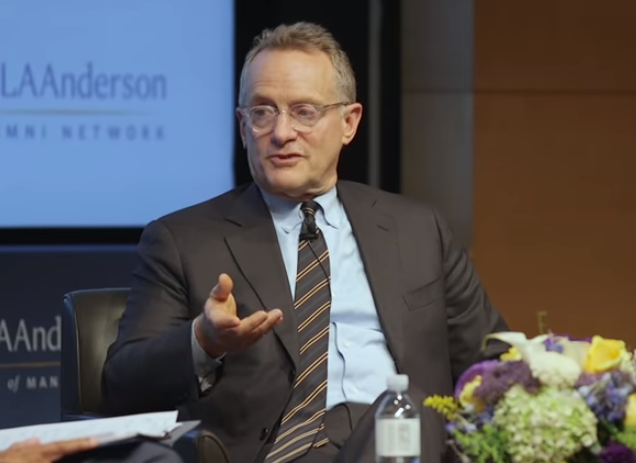In December, the world was collapsing in on Wall Street. There was no Santa rally. In fact, it was the worst month for the market since 1931 and the end of a terrible fourth quarter that saw September’s record highs crash into bear market territory.
“But markets aren’t always about extreme ups and downs; there are bull markets and bear markets, rises and corrections. With that in mind, I don’t believe that we’re in a bubble, and I don’t think we’re going to have a crash.”
Fast forward to February and here we are with the Federal Reserve suddenly dovish on raising interest rates, and the market is mostly up again.
Oaktree Capital Management co-founder and co-chair Howard Marks said in a recent interview with Goldman as part of its “Top of Mind” series, the latest installment being called “Where Are We in the Cycle,” that everyone can stop freaking out. In fact, Marks went so far as to “I don’t believe we’re in a bubble, I don’t think we’re going to have a crash.”
From Heisenberg Report:
Via Goldman
Allison Nathan: What do you make of the recent market volatility?
Howard Marks: To me, it just confirms that markets are psychologically volatile. On October 3, everything was fine; on October 4, the equity market began one of the biggest declines ever seen over such a short period of time, leading to the worst December since the Global Financial Crisis (GFC). Fundamentally, of course nothing had changed overnight, and not much has changed even over the prior few months; mostly it’s just that the market swung from looking at things optimistically to looking at them pessimistically. The truth is, most things can be viewed either positively or negatively, and the bias of onlookers influences which perception prevails at any point in time. All that said, I have argued since roughly mid-2017 that markets were excessively optimistic. And excessive optimism, faith in the future, and greed leave the market vulnerable to this type of sentiment-driven correction. So this episode just illustrates how much market violence emotion can wreak, especially from a place of too much exuberance.
Allison Nathan: But couldn’t at least some of last year’s optimism have been fairly attributed to strong US economic growth?
Howard Marks: What matters most to markets is not a good quarter or a good year, but what the future looks like. Case in point, last year we had some of the fastest US economic growth since the GFC, but some of the worst market performance. In my view, the economic strength post the US tax bill was like a shot of adrenaline in the economy; far from creating a stable platform for more rapid growth, I thought it would give us a couple of good quarters before either receding or necessitating more restrictive actions from the Fed to avoid excessive inflation. But people reacted very positively to it, and — most importantly — they extrapolated into the future the strong growth we were experiencing. I was getting emails from people saying, “Look at Australia—they haven’t had a recession in 26 years. Maybe the US won’t have a recession for 26 years.” That kind of Pollyannaish thinking told me there was too much hot air in the balloon. When assets begin pricing in the notion of permanent prosperity, it usually turns out to be an illusion.
Allison Nathan: Does this kind of behavior suggest to you that we are nearing the end of the economic expansion?
Howard Marks: I’m not an economist, and I don’t believe in forecasting; as investors we never know what’s going to happen, like I said, but we can know something about the odds. We’re in the second half of the 10th year of an economic recovery, and US economic recoveries have never lasted more than 10 years.
Allison Nathan: What does this mean for markets?
Howard Marks: Two questions I’m often asked are: “Are we in a bubble?” and “Are we going to have another crash?” This is understandable because those who came into the market as much as 25 years ago have seen two bubbles and two crashes. But markets aren’t always about extreme ups and downs; there are bull markets and bear markets, rises and corrections. With that in mind, I don’t believe that we’re in a bubble, and I don’t think we’re going to have a crash. Stock P/E ratios are pretty much in line with the postwar average. Banks are not highly levered. Most investing hasn’t taken place in vehicles as highly levered as the mortgage and loan vehicles of 2006-07. And I don’t see an analog for subprime mortgages today. So in many ways, the current environment is less precarious than 11 or 12 years ago. But for an investor, I think the next five years simply aren’t going to be as good as the last ten.
Allison Nathan: What late-cycle excesses worry you the most?
Howard Marks: I worry about the amount of debt in the system and about companies’ exposure to rising interest rates.
Allison Nathan: Are credit markets the most likely cause of the next downturn?
Howard Marks: “Cause” is a funny word. Yes, I would guess that the next big problem in the economy will emanate from the credit markets. But will that start the next recession? Not necessarily. The problem might start because of a trade war or for some other reason.
Allison Nathan: So how should investors be positioned today?
Howard Marks: To me, the key question is whether this a time for aggressiveness or a time for caution. I believe it’s a time for caution. Warren Buffett said it best: “The less prudence with which others conduct their affairs, the greater the prudence with which we should conduct our own affairs.”
